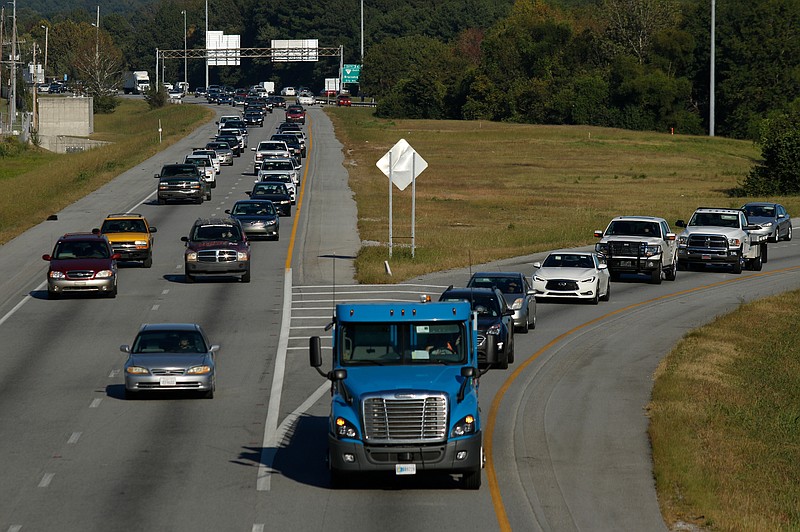Outlook 2018
The new year begins with the strongest economy in Chattanooga in more than a decade. A year-end survey found small businesses owners across America to be as optimistic in their business outlook as any time since the 1980s. Last year, the Chattanooga area added jobs at three times the pace of the country as a whole and the local economy is poised for another year of expansion. As the economic recovery enters its eighth year, sustaining the the same pace of economic growth and momentum is getting tougher, especially in a tight labor market with interest rates expected to edge higher through 2018. Nonetheless, the Chattanooga region is poised for growth this year from more road building, new battery-powered vehicles, additional apartment and subdivision development and continued growth in the region's changing entertainment and dining landscape.
Gary Farlow says that companies in the Cleveland, Tennessee, area depend on their products reaching the marketplace, and reducing bottlenecks on the region's roads is key.
"If we're trying to market our community to, for example, a new industrial supplier to Volkswagen, we want to make sure they can get their stuff there efficiently. That's money," says the head of the Cleveland/Bradley Chamber of Commerce.
Farlow says he supported the IMPROVE Act, the state legislation passed in 2017 that is projected to help tackle an estimated $10.5 billion backlog of 962 projects across Tennessee. IMPROVE stands for "Improving Manufacturing, Public Roads and Opportunities for a Vibrant Economy."
In Bradley County, projects aided by the IMPROVE Act include widening North Lee Highway from near Anatole Lane to State Road 308 in Charleston at a cost of $36.8 million.
Also, widening Interstate-75 from Cleveland urban boundary to Bradley/McMinn county line would cost $26.2 million.
In Hamilton County, the list of IMPROVE Act projects include widening I-24 beginning at I-59 at the Georgia line to U.S. 27 in downtown Chattanooga at an estimated cost of $171.5 million.
Here are some of the Chattanooga and regional projects Gov. Bill Haslam says will benefit under the IMPROVE Act:
* Interstate 24: Beginning at I-59 on the Georgia line, 10.3-mile project would widen I-24 to U.S. 27 in downtown Chattanooga. Estimated cost: $171.5 million.* Rebuild interchange of I-75 and I-24 in Brainerd and East Ridge. Estimated cost: $65 million* Upgrade interchanges on I-24 at Broad Street and Market Street to rework ramps and improve access from I-24 to the Southside. Estimated cost: $37 million.* I-75: Interchange modification at Hamilton Place mall: $40 million.* Work on six I-24 bridges, including over Rossville Boulevard ($6.2 million), eastbound lanes over Broad Street ($4.2 million), over old Southern Railway lines ($2.9 million), over Germantown Road ($3.2 million), over Central Avenue ($4.6 million) and Williams Street ($3 million).* Widen Ooltewah-Ringgold Road from Apison Pike to East Brainerd Road. Estimated cost for the 4.4 mile project is $56.7 million.* Widen Bonny Oaks Drive near Enterprise South from Industry Drive to Adamson Circle: $8.3 million. From Adamson Circle to west of Bonnyshire Drive: $20.7 million. From Bonnyshire Drive to I-75: $21.2 million.* Bonny Oaks Drive bridge over Chickamauga Creek: $5.1 million.* Rhea County: Widen eight miles of SR 30 from U.S. 27 to west of Tennessee River bridge. Estimated cost: $44.1 million.* Polk County: Ocoee River Gorge bypass. Phase 1 is a 23-mile stretch costing an estimated $300 million; Phase 2 is a $200 million project involving 2.1 miles through mountainous terrain.* Bradley County: Widen North Lee Highway from near Anatole Lane to SR 308 in Charleston: $36.8 million.* Bradley County: Build truck climbing lane on southbound I-75 at White Oak Mountain: $18 million.* Bradley County: Widen I-75 from Cleveland urban boundary to Bradley/McMinn county line: $26.2 million.
Additionally, plans call for rebuilding the interchange of I-75 and I-24 in Brainerd and East Ridge for $65 million, as well as upgrading interchanges on I-24 at Broad Street and Market Street to rework ramps and improve access to the Southside costing $37 million.
Under the IMPROVE Act, Tennessee's gas tax will increase from 21.4 cents per gallon to 27.4 cents while diesel goes from 18.4 cents to 28.4 cents per gallon by 2019.
Bridgett Massengill, chief executive of the Chattanooga-based Thrive Regional Partnership, says that transportation is one of the main initiatives of the group that emerged from the earlier Thrive 2055, three-state, 16-county regional planning effort.
Formerly under the Chattanooga Area Chamber of Commerce umbrella, the group which now has its own board and operates as a not-for-profit 501(c)(3), has put together what Massengill calls "a transportation guiding coalition."
The coalition includes people from business, industry, nonprofits and the public sector across the 16 counties aimed at tackling the area's transportation problems in "a holistic way," she says.
"It's not a one-state problem or a metro problem," Massengill says. "We need a collective."
Thrive Regional Partnership is doing what she terms "a deep dive" into areas such as freight and workforce mobility.
"If we can get business and industry to take a look at this and come up with solutions, we can advocate for this," Massengill says.
She says that Thrive wants to enable regional coordination aimed at less traffic congestion and better quality of life.
Tennessee Gov. Bill Haslam was in Chattanooga after the passage of the IMPROVE Act touting its benefits in Hamilton County, specifically mentioning the I-24/I-75 interchange.
He said the project "went from being improved seven to 10 years from now to hopefully being started as part of fiscal '18 work."
IMPROVE Act funds will pay for preliminary engineering in the project that is taking a "design-build" approach to streamline planning and construction. The state will issue a request for proposals on the design and construction of the project, instead of the usual approach using state plans and advertising for construction companies to bid on building it.
The infamous traffic-jamming interchange is one of the most heavily traveled transportation routes in the nation, officials say.
"It's probably about the worst interchange in the state of Tennessee," says TDOT Commissioner John Schroer, who predicts motorists will start seeing the improvements in 18 to 24 months.
The project to revamp the interchange is part of infrastructure investments for 101 individual projects in 40 Tennessee counties, including in Hamilton and surrounding counties.
In addition to the tax hikes in the act, the state also included an estimated $113 million cut on manufacturers' business taxes and a 20 percent reduction on grocery sales taxes, which amounts to an additional $125 million in cuts.
Massengill says that on top of an expected additional 400,000 people in the area in 40 years, the organization sees increased commercial traffic passing through in the coming decades.
"We know today the highest volume of freight traffic is moving through our region, more than any other metropolitan area in the country," she says. "We understand that with economic growth comes more pressure on infrastructure that's already buckling."
Increased capacity at the Panama Canal is expected to bring more shipping to Savannah, Georgia, which will generate added interstate freight traffic between Atlanta and Nashville, with Chattanooga at the crossroads, Massengill says.
"We can pull together regional leaders to understand what we're hearing from the Georgia Ports Authority," she says.

